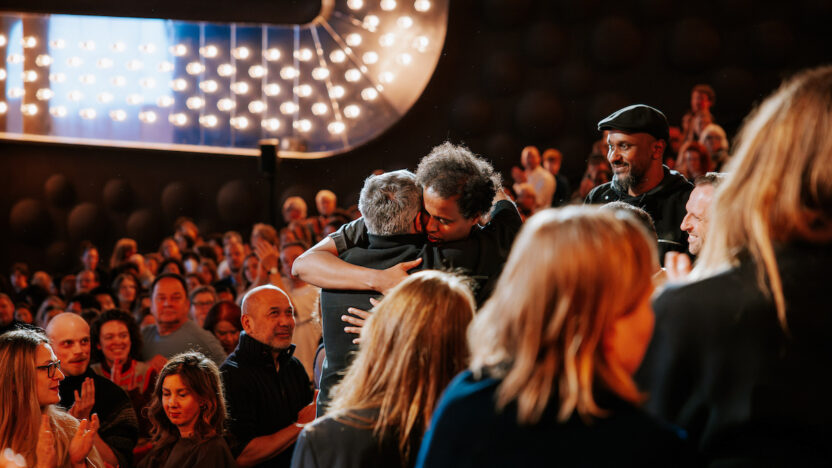Amat Escalante: “Rotterdam feels like home”
The first time Mexican filmmaker Amat Escalante visited Rotterdam was in 2002 to show his first short film Amarrados, the story of a homeless kid addicted to sniffing glue. He sat down with us to discuss his career, his special relationship with IFFR and his latest film Lost in the Night after it screened at IFFR 2024.

At the time of Amarrados, Escalante was only 21 and unsure he could make a living out of filmmaking after his short was rejected by the local film festival in his hometown in Mexico.
“My short was selected for Rotterdam and it motivated me greatly to think that I was on the right path and that someone appreciated and connected with what I was doing. I still remember the feeling when I was notified that my short was selected for the IFFR official programme. It was one of the best pieces of news I’ve received in my life to this day.”
“I still remember the feeling.”
This was just the beginning of a solid and prolific relationship. Since then, Escalante has been a regular at IFFR. His first feature film Sangre was supported by the Hubert Bals Fund for development, post-production and distribution, and was selected for Un Certain Regard in Cannes in 2005. He has also presented his projects at CineMart three different times with Sangre, Los Bastardos and Heli. The latter earned him the best director distinction in Cannes in 2013. The rest of his films have also screened at IFFR, including his latest, Lost in the Night, during the 2024 edition.

“I am loyal to the festival because it has been very important for me. They supported me in my early days, which is something very important and something not everyone or every institution can do. Here in Mexico, not only with the local festival in my city but also with government support, if you haven’t done anything, you get nothing. So, for me, getting institutional support here in Mexico, back then, was not an option.”
“It would have been basically impossible for me to get funding to make my first film.”
Making cinema in Mexico in the early 2000s was especially challenging. The country’s industry was just starting to take off after a deep period of crisis in the 90s, a time when only about 10 films were made each year. Now, the context is different and most of the films in Mexico would be able to exist without European co-productions, but for bold projects that take risks, such as Escalante’s, funds like the Hubert Bals Fund and European partnerships remain fundamental:
“Precisely because of the spirit of that fund, they are willing to take on projects that you don’t exactly know how they will turn out. It’s about trusting people more than a pitch or a script and all that, right? In Mexico, it would have been basically impossible for me to get funding to make my first film. And there are still many people in that situation, of course – the fund remains relevant.”

Through his career, Escalante’s films have been known for being provocative, ambiguous, and sometimes unpleasant, that navigate the complex terrains of violence, machismo, corruption, inequality and societal vulnerabilities within contemporary Mexican society. In Lost in the Night, a Mexican-Dutch-German co-production, the Mexican auteur unveils the corruption and socioeconomic inequalities in Mexico through the story of a teenager seeking vigilante justice after the forced disappearance of his mother, an environmental activist.
“I wanted to show this through a story that tries to engage and entertain.”
When asked about this film, he talked about his inspiration drawn from the environment around him, a Mexico dealing with increasing violence. “I believe that my approach always tries to show something inspired by what I see. I draw a lot of inspiration from genre cinema, suspense, horror, or science fiction, or in this case, intrigue and mystery. I wanted to attempt something in that mould using themes that inspire me, which are social but also economic, like the issue of foreign mines coming to Mexico, mostly Canadian mines, and how that affects the land and society. I wanted to show this through a story that tries to engage and entertain the audience.”
The film was among the top ten most-watched movies on Netflix Mexico for the first two weeks. Unlike his previous films, where he exclusively used amateur actors, Lost in the Night features professional actors and actresses: “The themes of fame, spectacle, and social media intrigued me. Casting well-known actors like Bárbara Mori, whose real-life background closely matched the character, allowed me to maintain authenticity similar to working with non-actors. This approach, using people genuinely connected to their roles, but also famous, helped attract a different audience and increased the film’s visibility.”
“There’s no way I could not talk about it just to avoid offending people.”
However, his films are not always as welcome in his home country. In the past his work has been criticised for the way he portrays the environment they are in: “At some point, it was even suggested in a financial newspaper that my screenwriter and I should be electrocuted like 100 years ago for supposedly defaming our country through our film Heli. I live in Mexico and am greatly affected by all the injustices and frustrations, all the inequality I see, and there’s no way I could not talk about it just to avoid offending people in Mexico because it was seen in Europe.”

Like in Heli, Lost in the Night exposes a country plagued by corruption and impunity, where justice seems to be the privilege of a few. In the Netherlands, the film screened on theatrical release with good responses from the public, and the critics, with De Volkskrant giving it four stars and defining it as a “gritty realism flows into hot-blooded satire about the gap between rich and poor” and Variety as a “beguiling class-divide mystery.”
“IFFR has been very special to me.”
A long journey has passed since the premiering of Amarrados to the screening of Lost in the Night in national cinemas. Don’t be surprised if next February you see Amat wandering the streets of Rotterdam, as he has said himself: “IFFR has been very special to me both personally and professionally. There’s the feeling that they believe in what I’ve been doing from the very beginning. As Sally Field said upon receiving her Oscar, ‘You like me, you really like me’, and if they like me, that makes me feel at home.”
By Elizabeth Naitzé Prado
A list with articles
-

IFFR closes its 55th edition celebrating an uptick in new, younger audiences and industry attendees
Published on:-
News
-
Press release
-
-

Shahrbanoo Sadat’s No Good Men opens Berlinale 2026 among strong HBF and CineMart lineup
Published on:-
CineMart
-
Hubert Bals Fund
-
IFFR Pro
-
-

